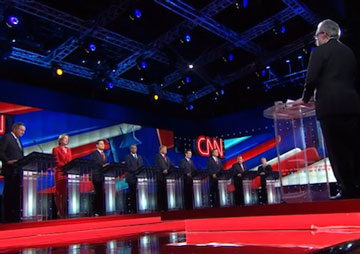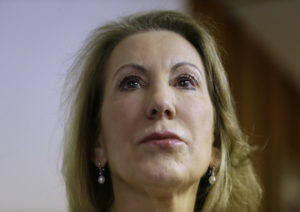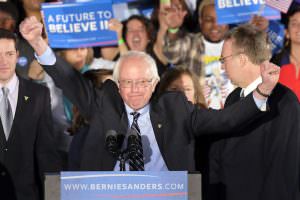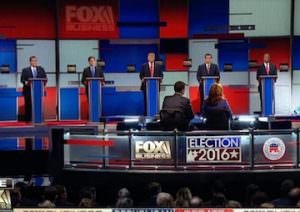Fifth Debate Reveals How Eager the Republican Candidates Are for More War
At the final debate of 2015, the Republican presidential candidates laid out how each would be a wartime president, with the most aggressive pledging to rebuild and unleash the full force of the military to slaughter Islamic State globally, confront Russia’s Vladimir Putin in Syria and eastern Europe and conduct cyber warfare and other actions against China.
By Steven Rosenfeld / AlterNet

Shutterstock
This piece originally ran on AlterNet.
At the final GOP debate of 2015, all of the Republican presidential candidates laid out how each would be a wartime president, with the most aggressive pledging to rebuild and unleash the full force of the military to slaughter ISIS globally, confront Russia’s Vladimir Putin in Syria and eastern Europe, and conduct cyber warfare and other actions against China.
At the same time, the Republicans uniformly spoke of expanding the U.S. security state apparatus so that the Pentagon, domestic police and technology sector would have unprecedented abilities to trace the activities of would-be terrorists on U.S. soil—whether they are citizens or not—while essentially freezing immigration and barring refugees from war zones.
The most important political development from Tuesday night’s debate was Trump’s pledge not to run as a third-party independent candidate if he doesn’t win the nomination. He now leads with more than 40 percent in the latest polls.
“I am totally committed to the Republican Party. I feel very honored to be the frontrunner,” Trump said, prompting applause. “I think I’ll do very well if I’m chosen… I will do everything in my power to beat Hillary Clinton, I promise you.”
The debate’s focus was on national security issues, which have become the top concern on voters’ minds following the terrorist attacks in Paris and San Bernardino, according to national polls. How to respond to ISIS was the foremost question, with candidate after candidate blaming its rise on Barack Obama and Hillary Clinton’s foreign policy, which they all described as filled with weakness, from not maintaining ground troops in Iraq to allowing the Syrian civil war to fester and ISIS to take root.
The arguing between the candidates began early, with a thin-skinned Donald Trump repeatedly clashing with Jeb Bush, who forcefully and repeatedly said Trump’s ideas were not to be taken seriously. Trump stood by his pledge to bar all foreign Muslims from entering the U.S., which was quickly criticized by Bush. “Donald is great at the one-liners, but he’d be a chaos candidate and he’d be a chaos president,” Bush said, adding, “You can’t insult your way to the presidency.”
Trump’s ban would not work, Bush said. “If we are going to ban all Muslims, how are we going to get them to be our allies… This is not a serious proposal.”
Trump replied, “Jeb has failed in this campaign,” launching sparks that would be repeated during the night.
Trump added that if suspected terrorists were found in the U.S he would deport them. He stood by his proposals to possibly kill family members of suspected terrorists and use whatever tool the police or military deemed necessary, including denying access to the Internet. When Kentucky Senator Rand Paul said these proposals underscored the question of whether Trump was a “serious candidate” because they would violate First Amendment rights and the Geneva Convention, Trump replied, “They can kill us, but we can’t kill them? That’s what you are saying….We need toughness. We need strength.”
The two candidates trailing Trump, senators Marco Rubio and Ted Cruz, took many swipes at each other but also said, like Trump, that the U.S. needs to spend billions rebuilding all branches of the military, including nuclear weapons, and put America’s might and troops to defeat ISIS. Rubio attacked Cruz for voting for a bill that modified the National Security Agency’s data collection program that warehoused all U.S. phone and Internet traffic; Cruz, in response, besides rejecting that charge, later attacked Rubio for supporting a comprehensive Senate immigration reform plan, saying it would have allowed would-be terrorists like the Pakistani wife of the San Bernardino shooter to get into the U.S.
Rubio repeatedly called ISIS the “most capable” and “sophisticated” terror threat, and pledged to lead a coalition of nearby Arab nations who would partner with U.S. troops and airpower to defeat it. Cruz, meanwhile, stood by his proposal to “carpet bomb” ISIS, mocking Obama for his “politically correct” considerations not to inflict civilian casualties in ISIS strongholds. When asked by the moderator if he was willing to kill “Hundreds of thousands of civilians in attacking ISIS, he said, “the object is not to level a city, but to kill the terrorists.”
There was significant debate between the candidates on whether the Syrian dictator and Russian ally, Bashar al-Assad, should be toppled. Rubio said Assad had to go. Cruz and Paul said that removing him would leave a vacuum filled by ISIS. Trump said the U.S. should focus on ISIS first.
The foreign policy threats listed by the candidates did not stop with ISIS. Former Hewlett-Packard CEO Carly Fiorina said that China’s military expansion and cyber espionage needed to be contained and they would only behave better once they felt the brunt of military exercises or economic sanctions. New Jersey Gov. Chris Christie, who kept posturing that he was the toughest candidate because he was a federal prosecutor in New Jersey after the 9/11 attacks, also said the U.S. should launch a cyber war with China—suggesting that the U.S. hack into Chinese online data and publicize incriminating evidence to show how corrupt its rulers are.
Fiorina said the U.S. should challenge Putin’s expanding sphere of influence by conducting military exercises near the Russian border in eastern Europe. She and Christie also said that they wanted to impose a no-fly zone in Syria, with Christie saying he didn’t care if the U.S. shot down Russian planes because that would put Putin in his place. “I think if you are in favor of World War III, you have your candidate,” Rand Paul replied.
While Christie, in his closing remarks, said the U.S. had to take whatever steps were needed to prevent “war at our doorsteps,” it’s clear that many of the Republicans would be wartime presidents bringing warfare to the world’s trouble spots.
Steven Rosenfeld covers national political issues for AlterNet, including America’s retirement crisis, democracy and voting rights, and campaigns and elections. He is the author of “Count My Vote: A Citizen’s Guide to Voting” (AlterNet Books, 2008).
Your support matters…Independent journalism is under threat and overshadowed by heavily funded mainstream media.
You can help level the playing field. Become a member.
Your tax-deductible contribution keeps us digging beneath the headlines to give you thought-provoking, investigative reporting and analysis that unearths what's really happening- without compromise.
Give today to support our courageous, independent journalists.






You need to be a supporter to comment.
There are currently no responses to this article.
Be the first to respond.